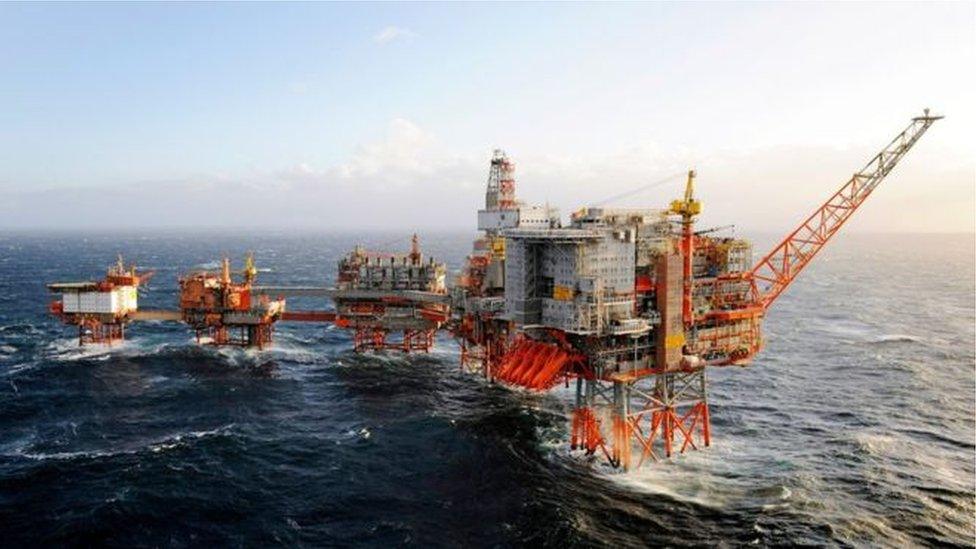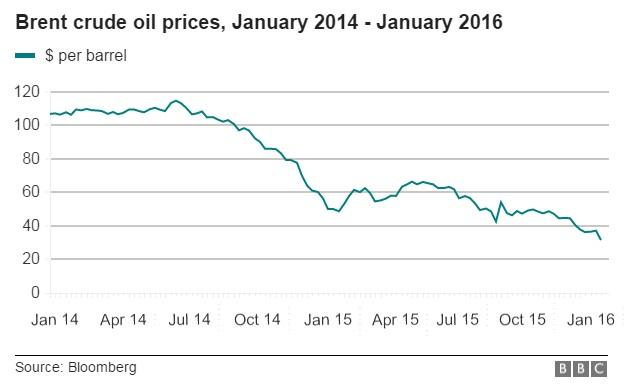Scottish cabinet calls on UK Chancellor to cut oil and gas 'tax burden'
- Published

The oil and gas sector in the North Sea is suffering as global prices continue to fall
Scotland's Finance Secretary John Swinney is to ask Chancellor George Osborne to ease the "tax burden" on the North Sea oil industry.
The move ahead of the UK government's budget in March was sanctioned by a meeting of the Scottish cabinet.
Ministers agreed that they would lobby to "remove barriers to exploration" and back reskilling.
A spokesman for the UK government said it was committed to supporting the oil and gas industry.
Concerns are growing for the sector as global oil prices continue to slide.
The cost of a barrel of Brent crude oil has fallen from more than $100 in January 2014 to less than $30 in January 2016.
The Scottish government believed fiscal policy was the "main lever for incentivising investment, exploration and production in the North Sea".
And because tax policy is reserved to the UK government, the cabinet decided that Mr Swinney should seek an "urgent meeting" with Mr Osborne to outline why taxes on the industry "must be lowered".

After the meeting, First Minister Nicola Sturgeon said that the oil and gas industry was a "huge success story" for Scotland.
It had also fostered innovation, supported energy security and skilled employment, and generated significant economic value, she added.
However, she went on: "There is no doubt the industry is currently facing an extremely challenging outlook, but oil and gas can continue to make a significant contribution to the Scottish economy and energy security for decades to come.
"However, this will only be achieved if we support the industry through this difficult period, encourage investment and ensure it remains well placed to benefit from a future upturn in oil prices."
Ms Sturgeon said the cabinet agreed to;
ensure the sector retained its world-class workforce by supporting high-quality training and enabling redeployment and reskilling within the industry
support the removal of barriers to exploration and improve collaboration between industry and academia
enable new and existing technology to improve production and processes
and address issues of access to finance "that can hinder growth and international activity"
Following news of the Scottish cabinet meeting, the UK government said that in last year's spring Budget, a package of reforms worth £1.3bn was available to support the sector.
A spokesman added: "This included reducing the headline tax rates and introducing a new Investment Allowance to reward companies investing in the UK Continental Shelf.
"This package is expected to encourage over £4bn of additional investment over the next five years. We also recently set out our strategy to maximise economic recovery through better collaboration between companies and improved cost-efficiency."
'Don't panic'
The focus on the oil and gas industry comes as financial services company KPMG said that "waning confidence" among potential sector lenders was a "real concern".
KPMG's Geoff Jacobs said: "Although lenders will want to remain supportive, businesses will have to take the initiative to demonstrate they have a strategy to navigate the current challenges to secure the ongoing support of their stakeholders and maximise their chances of coming through the current difficulties.
"Collaboration is a priority for the industry now and that also extends to the financial institutions with a stake in it.
"We know that our industry is cyclical and that the market will recover.
"For now it is a question of not panicking and doing everything possible to ensure that the industry maintains its ability to function when the tide begins to turn."
- Published18 January 2016
